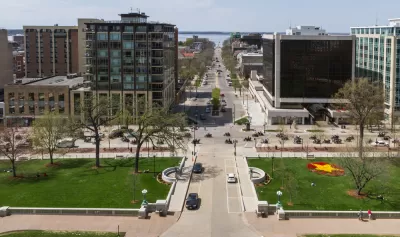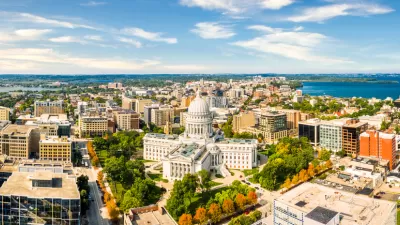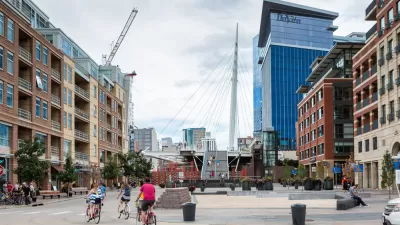A proposal to redevelop an area of South Madison with higher density and more housing options has drawn criticism from local residents who wanted to see more single-family housing included in the plan.

Despite calls by some residents to add more single-family homes to a South Madison redevelopment plan, Dean Mosiman reports that the Madison City Council approved the plan unanimously on Tuesday. The original plan, which aims to increase density near public transit and provide more housing options in South Madison, proposes 50 "cottage-style" homes, 54 single-family homes, 16 low- to medium-density units, and 120 units in multi-family buildings, while an alternative proposal "still envisions 50 cottage-style homes but increases the number of single-family homes to 65 on smaller, 3,000-square-foot lots, increases low- to medium-size residential units to 44, and doubles the number of units in mixed-use buildings to 240 while increasing the building height to eight stories." The proposed plan also includes expansion of a local park and transportation improvements.
A previous article by Mosiman describes the tensions between residents and city leaders who insist that encouraging denser construction is the only way to curtail the city's housing crisis. Opponents of the plan expressed concern about the 12-story height limit proposed for John Nolen Drive and displacement that could occur because of new development. According to Ald. Sheri Carter, "The vision is for more single-family housing, not creating a canyon effect on South Park Street, and increasing commercial spaces and business opportunities." But housing advocates say density does not have to prevent homeownership, and making housing more affordable will give more residents the opportunity to buy homes.
FULL STORY: Madison City Council approves dynamic new blueprint for South Side

Study: Maui’s Plan to Convert Vacation Rentals to Long-Term Housing Could Cause Nearly $1 Billion Economic Loss
The plan would reduce visitor accommodation by 25,% resulting in 1,900 jobs lost.

Alabama: Trump Terminates Settlements for Black Communities Harmed By Raw Sewage
Trump deemed the landmark civil rights agreement “illegal DEI and environmental justice policy.”

Why Should We Subsidize Public Transportation?
Many public transit agencies face financial stress due to rising costs, declining fare revenue, and declining subsidies. Transit advocates must provide a strong business case for increasing public transit funding.

Paris Bike Boom Leads to Steep Drop in Air Pollution
The French city’s air quality has improved dramatically in the past 20 years, coinciding with a growth in cycling.

Why Housing Costs More to Build in California Than in Texas
Hard costs like labor and materials combined with ‘soft’ costs such as permitting make building in the San Francisco Bay Area almost three times as costly as in Texas cities.

San Diego County Sees a Rise in Urban Coyotes
San Diego County experiences a rise in urban coyotes, as sightings become prevalent throughout its urban neighbourhoods and surrounding areas.
Urban Design for Planners 1: Software Tools
This six-course series explores essential urban design concepts using open source software and equips planners with the tools they need to participate fully in the urban design process.
Planning for Universal Design
Learn the tools for implementing Universal Design in planning regulations.
Smith Gee Studio
Alamo Area Metropolitan Planning Organization
City of Santa Clarita
Institute for Housing and Urban Development Studies (IHS)
City of Grandview
Harvard GSD Executive Education
Toledo-Lucas County Plan Commissions
Salt Lake City
NYU Wagner Graduate School of Public Service





























